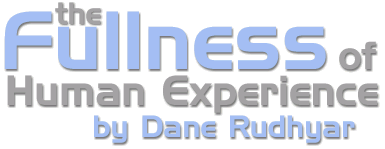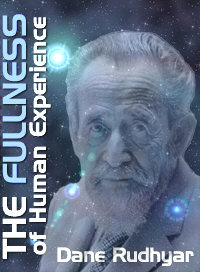 |
| Home | Bio | Art | Music | Literature | Civilization & Culture | Philosophy of Wholeness | Theosophy & Spirituality | Astrology |

CHAPTER SIX
The Formative and Separative Operations of Mind - 8 A human society and culture are preliminary and transitional attempts to produce enduring structures of interorganismic and interpersonal integration; but these structures are still dominated by biological forces and rhythms. The Pleroma type of integration is based on the use of energies that basically transcend the biological level of operation. It is based on the kind of individual selfhood which does not depend for its operation on what is perceiyed today as a physical body. The full power and meaning of personhood, as a totally effective Solution to the karmic situation having taken form as our planet Earth and all it includes, are actualized and understood only in terms of the Pleroma experience in which all individualized persons are to participate. This italicized "all," however, refers to what will be left of humanity in the omega phase of our cycle of planetary evolution (and in the larger sense, of the cycle of our entire universe)-the biblical "remnants," the Seed-Manu as a "race of Buddhas and Christs" (The Secret Doctrine, volume two, p. 483, original edition). This Pleroma experience includes and requires the activity of a mind that has become at least aware of the operation of a superindividual (or rather trans-individual) principle of organization which is not limited to the level of cultural or social integration, but operates in terms of the whole planet. This new mind is the mind of wholeness to which I have referred several times. But it is also mind as the still unsure but dedicated servant of the subjective desire to identify one's personhood (if it has acquired an individualized form, distinct from the mass vibrations of present-day mankind) with the place-and-function in the planetary structure of the Pleroma which constitutes the person's supreme identity. This place and function are, as it were, waiting to be actualized; but the process of actualization requires the operation of a principle of organization which transcends the level of any culture and of a culturally defined personality whose name symbolizes its bondage to the psychism of the culture as a whole. In the immense majority of instances today, the type of personhood actualized in molecular, biological, and sociocultural structures is only a crude approximation of what personhood means when understood in terms of the entire cycle of the Movement of Wholeness. Similarly, the ego-mind, or even the mind of an autonomous and responsible self, represents only a transitional state of mental development It is a state still heavily dominated not only by the compulsiveness of life-instincts and the exclusiveness manifest in any culture, but by the pressures of karmic patterns. It is mind in crisis, trying to operate on the battlefield of warring desires, but pulled in rapidly altering directions by the ups and downs of the encounter. The formalistic and inertial character of mental processes, and especially of their neuro-cerebral means of operation in biological and social terms, adds to the confusion. The unfamiliar and novel nature of the potency factor in such situations (that is, the nature of social power, manifesting today mainly as the possession of money) presents another set of problems. The three factors in the type of experiencing possible at this new human level are involved in the difficulties and crises engendered by the development of personhood. The most basic problems in this "human condition" are derived from the capacity of the subjective factor to detach itself from a situation and to assume as an external entity the role of a subject, "I myself." In that role the subjective factor may have desires and preferences which do not conform to the developing trend and the rhythm of the Movement of Wholeness. Aroused by such disharmonic desires, mind also begins to operate in a state of non-resonance to archetypes which the divine mind had developed as Solutions to problems raised by the ancient failures. A "personal" mind replaces to a large extent the "archetypal" mind. But today, as mentioned already, the term "personal" does not usually refer to the personhood manifesting in the Supreme Person as a divine solution to karma, but instead to a very limited and relatively individualized aggregate of desires. These desires, in most cases, remain dominated by biological needs and/or by a more or less violent reaction to the collective patterns of the basic culture and the popularized procedures and fashions of a class or a generation of human beings reacting to the emergence of a new kind of power. This personal mind, more or less a faithful servant of the desires of the individualizing subject, is adept at rationalizing and evading basic issues in the development of personhood. It should rarely be trusted as a constructive factor in complex crisis situations. Mind can also act in such situations as a power of disintegration. The analytical mind, which fragments, reduces to what seems to it basic facts, and endlessly argues to prove its points, is a catabolic factor in the process of individualization. It can be very effective in breaking down old unsubstantiated beliefs and sclerotic patterns of thinking, feeling, and behavior. It may also disclose the massive, relentless, yet hidden operations of a will which (like a national Army and its leaders) has learned to use power for its own glory. Power may be used simply to perpetuate itself as a dominant force, either in a nation, or in an individual person racked by a poignant sense of insecurity and/or impotency. In such cases the danger to avoid is the growth of a super-ego (or super-individualized self) that becomes so separative and power-intoxicated that the development of a Pleroma type of integration is rendered impossible. An answer to, or antidote for such a danger is provided by the rise of an intense feeling of devotion (bhakti) to a personage able to radiate at least some of the characteristic qualities of the Pleroma level of being. It should be, however, devotion to a personage as the performer of a role which should focus upon him or her at least a reflection of Pleroma power, rather than to a person. When such a devotion is a dominant factor, mental processes are usually devaluated. The ultimate purpose (consciously understood or not) is the transmutation of desire; yet the overcoming of the fear of being separated from the mass-vibration of the community at its normal level of operation, and thus of being isolated and alienated, may be the first requirement to be met. The higher Community (the Pleroma) always seeks to act, to help the individual subject in crisis. Nevertheless, karmic patterns may present obstacles which have to be dissolved; and the process of dissolution often operates in "strange and wondrous" ways. A fundamental reorganization of the mind should be synchronous with a repolarization of the subjectivity factor. When the subject, I-myself, ceases to feel separate from the tidal flow of the Movement of Wholeness — thus, when personhood is reintegrated in the Movement and is conscious of itself as an essential polarization of the principles of Unity and Multiplicity — mind sooner or later is re-attuned to the process that created archetypes before the beginning of this objective material universe. In that attunement mind finds a strength that transcends the vagaries of the many systems of cultural, religious, and interpersonal relatedness. This strength is based on the realization of invariant principles operating through all cycles, long or brief as they may be. It is the strength of a consciousness free at last from the tension and the pride of individualized selfhood, and able to interpret and evaluate any situation sub specie eternitatis. By permission of Leyla Rudhyar Hill Copyright © 1986 by Leyla Rudhyar Hill All Rights Reserved.  Web design and all data, text and graphics appearing on this site are protected by US and International Copyright and are not to be reproduced, distributed, circulated, offered for sale, or given away, in any form, by any means, electronic or conventional. See Notices for full copyright statement and conditions of use. Web design copyright © 2000-2004 by Michael R. Meyer. All Rights Reserved. |
 |
